- Home
- J. F. Penn
Delirium (London Psychic) Page 3
Delirium (London Psychic) Read online
Page 3
He needed to know – which meant he had to look more closely. Blake pulled on one of his gloves, not quite ready to experience visions from whatever was in the package. He reached in and took out an object wrapped in a white handkerchief. Blake remembered how his father had always worn one, ironed perfectly into a pocket square for his suits. A man should dress for his station, he would say, the Lord demands us to be our best. An English affectation, Blake thought with a short smile. Perhaps it said more about his father's immigrant sensibilities than anything the Lord demanded.
The handkerchief was wrapped like a parcel. Blake slowly pulled the edges away to reveal his father's watch, a vintage Patek Philippe, the gold of its face tarnished and the leather strap worn, but still a beautiful piece. Blake's chest tightened and he concentrated on breathing, as a flash of memory took him back. He knelt at the altar while the Elders prayed aloud in tongues, his father's right hand slamming down the cane. Blake's eyes fixed on this watch on his father's left wrist, knowing the time it took to reach the bloody end of his penance and weeping while the seconds ticked away. He felt an echo of pain in his hands and he rubbed them, clenching his fists together as if holding hands with his past self might steel him to the memory.
The watch had been his grandfather's, and his father only took it off at night. For this to leave his wrist for any longer meant that he was seriously ill. Had he asked for it to be sent? Did his father want to see him? Or would it just be a final agony to know that Blake was still an outcast from his family, still considered to be of the Devil. Old age would not lessen the man's fundamental beliefs, but only make them more extreme. The strokes themselves would be seen as an attack from Satan, the tribulations of Job perhaps, and Blake imagined the church praying for their leader, interceding with God for His divine intervention. The reality was that his father was an old man.
Blake exhaled slowly, trying to calm his heart rate. The anxiety that gripped him even at the thought of his father seemed ridiculous now, yet still it held him fast. He wanted to touch the watch and feel something of what his father experienced, but he was also afraid of what he might see. When he was young, he had seen visions from his parents' things – he couldn't help it living in their house. But the glimmers of lust and violence from his father and the shuttered, rigid calm from his mother had frightened him. That's when Blake had first taken to wearing gloves, when his hands weren't bandaged from the beatings.
He took his glove off again and set a five-minute alarm on his smartphone. Sometimes the visions were too much, and he could be lost in overwhelming sights and sounds that left him on the brink of collapse. Sometimes Blake wondered if he should see a psychiatrist about his experiences, but he pushed away the fleeting doubts about his own sanity. These days, his reading helped to solve crimes. He remembered reading the ivory Anatomical Venus figurine with Jamie present and how she had pulled his hand away from the object, helping him out of the trance. But she wasn't here right now, and Blake wanted to see into his father's life. He needed to know whether he should go home and face his childhood fears.
Placing his hands over the watch, Blake gently laid them down, his fingertips connecting with the cool metal on the edges of the face and the smooth glass that covered it. Despite the scars, his sensitivity had only increased with age and experience. Blake let the visions come in a rush, breathing slowly as they swirled about him, glimpses of life flashing by. He sifted through the stream of impressions that assaulted his mind.
He went into the most recent remembrance, the raw emotion of a man crippled by multiple strokes, an awareness of mortality and fear of dying overlaid with too much pride to acknowledge the truth of the end. Blake looked out at the bedroom in his old house, but it was no longer the room he remembered.
The walls sprouted with black growths like nodes of cancer in a smoker's lung, spotted with dull green mold. In places, trickles of liquid ran down, pooling on the bare floorboards in patches of tainted burgundy, like diseased blood. Above the fireplace, one of the lumps moved and Blake realized it was a living creature. The hairs rose on the back of his neck as he perceived a bony spine and tail with skin like tar, the thing's face jagged and its eyes bright with lust for death. It shifted, its gaze lighting on the bed. Blake felt its stare invade his body, examining every cell for a sign of the inevitable end. He heard a moan and knew his father had made the sound: it was all he could utter. But there was no exorcism, no prayers he could invoke to cleanse the room of this filth. Hooded lids closed again as the dark creature waited. Blake sensed that it wouldn't be long now before it would feed.
He tried to see past the creatures and the corruption of the room. Was this some kind of hallucination, a manifestation of his father's worst fears, brought on by the stroke? Or could it be that he was seeing past the physical world into the spiritual realm? If that was true, then the God his father had served for a lifetime had forsaken him, for the room was filled with terror and the promise of Hell.
Blake pulled back, filtering the memories that were attached to the watch. He perceived an overwhelming sense of fear that overlaid everything, a panic barely held back by the violence of his father's fervent prayer and brimstone preaching. It was something he had never expected, for Magnus Olofsson had been the definition of strength, a watchtower the needy had run to for leadership and shelter. That fortitude had been the basis of respect in their community, where perspectives and lifestyles were held over from days long past. When Blake had walked out, he had changed his name as a final separation. Daniel Blake Olofsson had become Blake Daniel, and disappeared to a new life.
In the vision, he saw his mother's face, her eyes closed in prayer, and he felt his father's guilt as he looked at her. The emotion was so strong that Blake pulled away from the sensation quickly. He couldn't stand to know what his father was guilty of, not right now. But he held back from leaving the trance completely.
He had to go there, he realized. He had to return to the place he had run from years ago, and so Blake parted the veils of memory. He saw his own face as a young boy, kneeling by the altar in the church, tears running down as men surrounded him. He felt the righteous rage inside his father, but that anger wasn't directed at Blake, his son, it was at the Devil for taking him. Blake felt an echo of his father's thoughts as blood dripped onto the altar, He punishes the children and their children for the sin of the parents to the third and fourth generation.
The alarm pierced Blake's thoughts and he anchored his mind on it, pulling his hands away as he returned to the room under the British Museum again. Why was the verse from the book of Numbers in his father's mind as he labored with the cane? What sin had his father committed that God would punish his child for atonement?
Chapter 3
Harley Street had long been noted for its private medical practices, and the very name resonated with old money and privilege. Number 37 was on the corner of Queen Anne Street, a Victorian five-story house with ornate windows. Jamie glanced up to the sculptures on the facade, displaying a laurel-crowned figure with volumes of Homer and Milton, and a reclining young man with a telescope and a star. Poetry and astronomy seemed curiously out of place on this street of medical history.
Missinghall unfolded himself from the police car, beginning his second morning pastry and offering Jamie a bite. His large frame meant he was always eating, and he chipped away at trying to get Jamie to eat more, tempting her with little morsels. Her clothes were loose around her hips now, and she often forgot to eat until she was nauseous with hunger by the end of the day. The physical reminder of her body's insistence for life was something she danced on the edge of resisting. Jamie had read that the Jain religion had a ritual death by fasting, and the vow of sallekhana could be taken when an individual felt their life had served enough of a purpose: when there were no ambitions or wishes left and no responsibilities remained. Some days, Jamie wanted to embrace such an end, but Polly had told her to live, to dance, and her responsibility was still to bring justice to the dead
. But was that enough of a purpose to keep her going?
It would have to be for today, Jamie thought, and accepted the offer of pastry with a smile. Missinghall broke off a generous piece and Jamie forced it down her throat, the act of swallowing almost against her will.
"There should be a housekeeper here," Missinghall said, brushing crumbs from his suit. Jamie noticed that he had red socks on today, peeking out from under his slightly too-short trousers, his way of bringing color to their dark work. "She manages the place for the practitioners."
Jamie pressed the buzzer and after a moment, the door opened. A slim woman in jeans and a Rolling Stones t-shirt stood at the entrance, her cropped ash-blonde hair belying her middle age. Jamie showed her warrant card and introduced herself and Missinghall.
"Of course, I was expecting you," the woman said. "What a business. Dr Monro dead. Well, I never." She shook her head. "Come in, come in. I haven't touched anything in his rooms, just like the officer told me on the phone."
She led them into the hallway.
"How many practices are there here?" Jamie asked.
"Four," the housekeeper said. "They keep themselves to themselves, and I look after all their rooms. Not that any of them are much trouble, you know."
"Any tension between the businesses at all?"
The woman turned on the first step of the stairs.
"Not that I would know about, Detective. But then I'm just the housekeeper now, aren't I?"
Despite her words, Jamie could see a cloud in her blue eyes. There was more here, but perhaps the rooms themselves would help set the scene before she pushed any harder.
On the second floor, the housekeeper unlocked a wooden door, inset with two half panes of stained glass featuring red and blue art deco roses.
"You can look around, and please take all the time you need, Detectives. I'll come back in a bit. Would you like tea?"
"Yes, please," Missinghall jumped at the chance. "We're both black, one sugar."
Jamie stepped into the room, pulling on a pair of sterile gloves as Missinghall did the same behind her.
She had expected a cozy nook with a couch and blankets, somewhere welcoming for private therapy. Instead, the rooms were fashioned in a Japanese minimalist style, with just two chairs and a small table in one main space and a study beyond. The walls were a light cream, with nothing to decorate the space. It was entirely blank, offering the patient no respite from their own mind.
Walking into the study area beyond, Jamie noted the filing cabinets of patient records and a general neatness and organization. There were thick medical textbooks on a bookshelf as well as a framed degree certificate, and a couple of files and a fountain pen lay on a desk of Brazilian walnut. In the corner was a small fridge, topped with a kettle and coffee plunger. On the wall, a single large canvas showed a blue ocean with white-capped waves. On first glance, the waters seemed calm, but as Jamie looked at it more closely, she noticed the darkening skies towards the edge of the painting as a storm approached. Under the waves there were shadows, darker patches of blue that could have been creatures of the depths. It was a strange painting, perhaps one of Monro's analysis tools, the shadows interpreted according to the viewer's perspective. Jamie imagined sharks there, with razor teeth to shred her flesh, but she still felt an urge to sink under the blue.
Missinghall walked to the back of the study, where another door led onwards. He turned the handle. It was locked.
"That's his private apartment," the housekeeper said, walking in with the tea and a plate of biscuits. "I was never allowed in there. He was particular about that."
"Did he live as well as work here, then?" Jamie asked.
"Let's just say he didn't have a routine that meant he left his rooms too much." She hesitated. "I think that was a problem with some of the other partners in the building. He needed heating, electricity and other amenities at night, and never paid more than his allotted percentage. But of course, the other practices have wonderful people in them. None of them could possibly be involved in his murder."
Jamie smiled, helping her with the tea things. "Of course."
"I'll come back in a bit then, see if you need anything else."
"Thank you."
As she left, Missinghall pulled an evidence bag from his pocket, a bunch of keys visible inside.
"I thought we might be needing these," he said. "They were in Monro's jacket pocket."
Using the bag as a second glove, he maneuvered the keys, trying them against the lock for size until one fitted. He turned the key and pushed open the door.
"Ladies first," he smiled at Jamie, and she nodded her head, walking through ahead of him. It was dark inside, the windows shaded, so it was hard to see at first. As Missinghall flicked on the light, Jamie gasped at what they saw.
The room was dominated by a gynecological bed in the center, with green padded cushions and the addition of leather straps at each end, as well as stirrups and supports. Under the table was a wooden box. Missinghall lifted the lid to reveal a number of different crops, whips, eye masks and a ball gag.
"Bloody hell, I wasn't expecting that," Missinghall said, eyebrows raised. "I thought this guy was a psychiatrist, not some kind of sexual services provider."
"He was only supposed to be interested in their minds," Jamie said, walking around the bed. "But clearly, he liked to take things a little further."
She walked to a desk near the shaded window and turned on the lamp. A large leather notebook lay in pride of place, with a serpent-green fountain pen beside it. Jamie opened the book, examining Monro's handwriting within. The last page was an account of a session with a client he called 'M,' noting her response to the discipline and how many strokes she had endured. There were some musings about the efficacy of physical restraint on the mad, how they were more comfortable being punished than being left alone to get well, and how perhaps the original Bedlam had been correct in chaining the inmates. There were quotes from a Dr George Henry Savage: I would rather tie a patient down constantly than keep him always under the influence of a powerful drug … The scourging of the lunatic in times past might have occasionally been a help to recovery.
Jamie frowned as she flicked through the pages, seeing multiple entries over the last month, the same initials appearing several times. Were these willing participants in Monro's extra services, or did he use his position of power to coerce his clients? Was one of them responsible for his death?
Above the desk was a bookshelf with four more of the large journals. Jamie pulled another one down, finding the same type of information but with other initials. Monro had clearly been doing this for years, so it was conceivable that patients had come to him specifically for this kind of treatment. Complaints about his professionalism would have shut him down a long time ago otherwise.
"You'll want to see this, Jamie."
She turned to see Missinghall looking into a large walk-in closet. He moved aside to let her enter. A wall-size cabinet dominated the space, filled with all kinds of pharmaceuticals, some regulated substances, others common antidepressants and antipsychotics. None of them should have been kept on the premises in such large doses.
"He was dealing, as well? What wasn't this guy into?" Missinghall shook his head, moving over to check one of the filing cabinets, his gloved fingers flicking through the tabbed index.
Jamie sighed. "We're going to have to go through his list of clients, past and present. Clearly the murder was related to madness somehow, but it could have also been about sex or drugs."
"I don't think it was money, though," Missinghall said, holding up a bank statement. "His balance is unhealthier than mine."
Jamie frowned. "Which doesn't fit with the implication of selling drugs directly. So where's the money?"
There was a ring on the doorbell, and they heard the steps of the housekeeper and then her voice, faint from downstairs. The tread of two sets of footsteps ascended to the second floor. Jamie went back into the main room, pulling the
door of the inner sanctum closed, leaving Missinghall to continue to go through paperwork. The housekeeper knocked and then pushed open the door to the practice rooms.
"Detective, there's a Mr Harkan here. He says it's important."
Harkan was thin and fair, with the rosy cheeks of a choirboy who had never quite grown up. He put out a graceful hand to introduce himself to Jamie as the housekeeper headed off downstairs again.
"I'm sorry, Detective, but this couldn't wait. I just heard about the murder – the news is already out, I'm afraid, and Harley Street is a tight-knit community. I'm a solicitor. Our firm is just down the street, and we worked with Monro. He was a forensic psychiatrist as well as a clinical practitioner."
"A man of many talents," Jamie said, thinking of the room out back.
"Indeed," said Harkan, and Jamie noticed his eyes flick towards the door. Did the solicitor know what lay beyond?
"What exactly did he work with you on?" she asked.
"Forensic psychiatry is the intersection of law and the psychiatric profession, and Monro helped assess competency to stand trial. He was an expert witness around aspects of mental illness, both for the prosecution and the defense. He also assessed the risk of repeat offending."
"So why the hurry to talk to us?" Jamie asked. "You could have come down to the station with a statement."
"It's the timing," Harkan said, wringing his hands. "Monro was an expert witness for the prosecution in the case of Timothy MacArnold a few years back. A violent, repeat offender who claimed mental illness drove his actions, and Monro supported that in his testimony. MacArnold is in Broadmoor, the maximum-security mental health hospital for violent offenders."

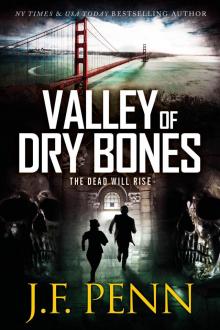 Valley of Dry Bones
Valley of Dry Bones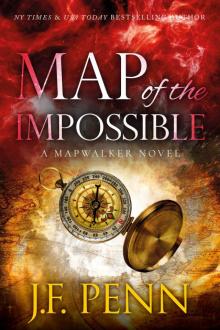 Map of the Impossible
Map of the Impossible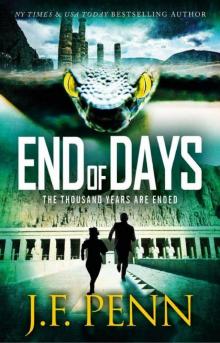 End of Days
End of Days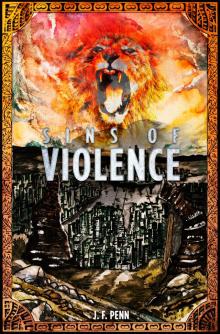 Sins of Violence
Sins of Violence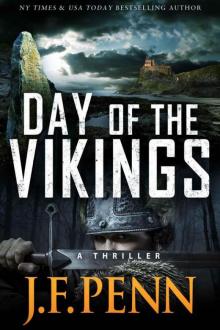 Day of the Vikings
Day of the Vikings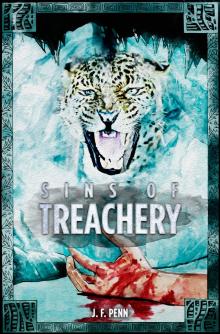 Sins of Treachery
Sins of Treachery A Mapwalker Trilogy
A Mapwalker Trilogy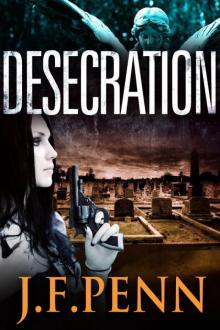 Desecration
Desecration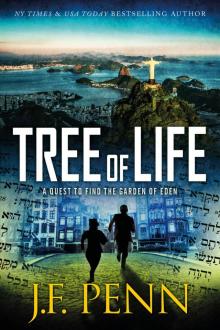 Tree of Life
Tree of Life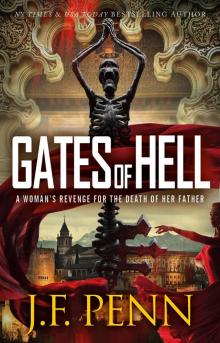 Gates of Hell
Gates of Hell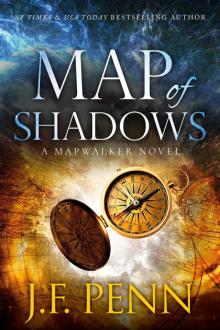 Map of Shadows
Map of Shadows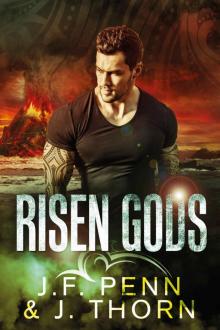 Risen Gods
Risen Gods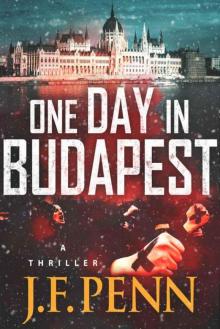 One Day In Budapest
One Day In Budapest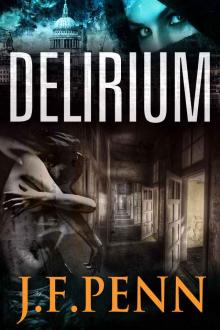 Delirium (London Psychic)
Delirium (London Psychic)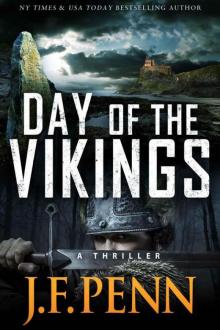 Day of the Vikings. A Thriller. (ARKANE)
Day of the Vikings. A Thriller. (ARKANE)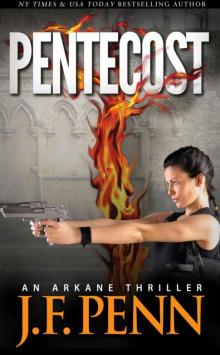 Pentecost. An ARKANE Thriller (Book 1)
Pentecost. An ARKANE Thriller (Book 1)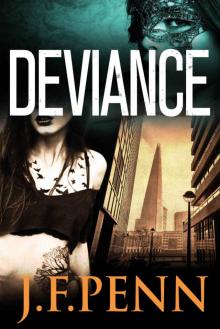 Deviance (The London Psychic Book 3)
Deviance (The London Psychic Book 3)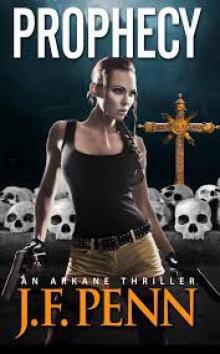 Prophecy. An ARKANE thriller. (Book 2)
Prophecy. An ARKANE thriller. (Book 2)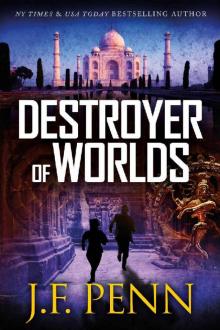 Destroyer of Worlds (ARKANE Book 8)
Destroyer of Worlds (ARKANE Book 8)